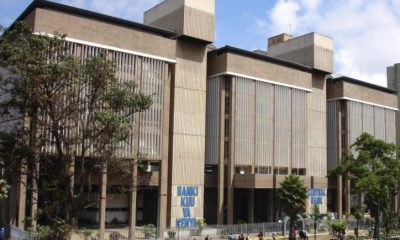Economy
CBK Bypassed Procurement Law in Secret Sh14.5 Billion Currency Deal with German Firm
The deal’s details only emerged after the National Assembly’s Finance and National Planning Committee compelled Governor Thugge to reveal the German firm’s identity and the contract’s cost to taxpayers.

The Central Bank of Kenya finds itself under intense scrutiny after the Auditor-General revealed that the institution flouted procurement regulations in awarding a massive Sh14.5 billion currency printing contract to German company Giesecke+Devrient Currency Technologies GmbH, deliberately keeping the Public Procurement Regulatory Authority in the dark about the deal.
The controversial five-year contract, signed in April last year, marks a significant shift from Kenya’s decades-long relationship with British printer De La Rue, which previously held the lucrative currency printing monopoly.
Under the secretive arrangement, the German firm will produce 2.04 billion bank notes over the contract period to replace worn-out currency, serving a market where approximately 330 billion notes currently circulate.
Auditor-General Nancy Gathungu’s findings paint a damning picture of regulatory circumvention, revealing that CBK Governor Kamau Thugge’s institution failed to follow established internal processes before initiating the procurement.
The bank bypassed critical requirements including the identification and assessment of suitable currency suppliers, the appointment of a special committee to handle classified procurement, and most significantly, mandatory monitoring by the PPRA Director-General.
The procurement law is unambiguous in its requirements for classified tenders.
Regulation 84 of the Public Procurement and Asset Disposal Regulations 2020, anchored in section nine of the main Act, explicitly empowers the PPRA to monitor all classified procurement information and provide recommendations to the Treasury Cabinet Secretary before any contract award.
This oversight mechanism exists specifically to prevent collusion, insider dealings, and inflated pricing that often accompanies non-competitive bidding processes.
The regulatory framework demands a comprehensive paper trail for classified procurements.
Accounting officers must submit detailed lists of classified items to the Cabinet Secretary by July 30th each financial year, complete with justifications for using classified procurement methods and estimated costs for each category.
These submissions must include reports detailing supplier selection processes and require Cabinet approval before implementation.
CBK justified its secretive approach by citing risks of a potential stockout of bank notes, arguing that such a scenario would have created grave economic and security implications for the country.
However, critics question whether this emergency rationale warranted completely bypassing established oversight mechanisms designed to protect public resources and ensure competitive pricing.
The deal’s details only emerged after the National Assembly’s Finance and National Planning Committee compelled Governor Thugge to reveal the German firm’s identity and the contract’s cost to taxpayers.
This parliamentary intervention highlights the excessive secrecy surrounding a transaction involving substantial public funds and critical national infrastructure.
The new currency notes will bear the signatures of Dr. Thugge and Treasury Principal Secretary Chris Kiptoo, featuring 2024 as the year of print.
While maintaining most features from the 2019 series, the notes will incorporate new security threads with color-changing effects specific to each denomination, representing technological advances in anti-counterfeiting measures.
The contract’s backdrop includes the closure of De La Rue’s Kenyan operations in March 2023, where the government held a 40 percent stake.
The British company’s departure involved significant costs, including £15.1 million spent on laying off over 300 workers, legal fees, and asset write-offs, effectively ending a long-standing partnership that had served Kenya’s currency needs for decades.
Current circulation data from December 2023 reveals the scale of Kenya’s currency ecosystem, with over 657 million notes in circulation valued at Sh340.28 billion.
The denomination breakdown shows 1,000-shilling notes comprising the largest portion at 290.98 million pieces, followed by 100-shilling notes at 155.62 million pieces.
The PPRA’s exclusion from this process represents a significant regulatory failure that undermines transparency in public procurement.
The Authority’s mandate extends beyond mere oversight to ensuring that classified procurements deliver optimal value for taxpayers while maintaining competitive standards even within secretive frameworks.
As the controversy unfolds, questions persist about whether CBK’s actions constitute a deliberate attempt to avoid scrutiny or reflect systemic weaknesses in implementing procurement regulations for classified items.
The Auditor-General’s findings suggest the former, indicating a calculated decision to bypass established oversight mechanisms.
The Treasury and CBK’s silence on requests for additional comments further compounds concerns about transparency in this significant public expenditure.
With taxpayers ultimately bearing the Sh14.5 billion cost, the lack of proper oversight mechanisms raises fundamental questions about accountability in managing critical national contracts.
Kenya Insights allows guest blogging, if you want to be published on Kenya’s most authoritative and accurate blog, have an expose, news TIPS, story angles, human interest stories, drop us an email on [email protected] or via Telegram
-

 Grapevine1 week ago
Grapevine1 week agoAlleged Male Lover Claims His Life Is in Danger, Leaks Screenshots and Private Videos Linking SportPesa CEO Ronald Karauri
-

 Lifestyle1 week ago
Lifestyle1 week agoThe General’s Fall: From Barracks To Bankruptcy As Illness Ravages Karangi’s Memory And Empire
-

 Grapevine3 days ago
Grapevine3 days agoRussian Man’s Secret Sex Recordings Ignite Fury as Questions Mount Over Consent and Easy Pick-Ups in Nairobi
-

 Investigations2 weeks ago
Investigations2 weeks agoEpstein Files: Sultan bin Sulayem Bragged on His Closeness to President Uhuru Then His Firm DP World Controversially Won Port Construction in Kenya, Tanzania
-

 Business2 weeks ago
Business2 weeks agoKRA Can Now Tax Unexplained Bank Deposits
-

 Investigations1 week ago
Investigations1 week agoEpstein’s Girlfriend Ghislaine Maxwell Frequently Visited Kenya As Files Reveal Local Secret Links With The Underage Sex Trafficking Ring
-

 News1 week ago
News1 week agoState Agency Exposes Five Top Names Linked To Poor Building Approvals In Nairobi, Recommends Dismissal After City Hall Probe
-

 Business1 week ago
Business1 week agoM-Gas Pursues Carbon Credit Billions as Koko Networks Wreckage Exposes Market’s Dark Underbelly




























